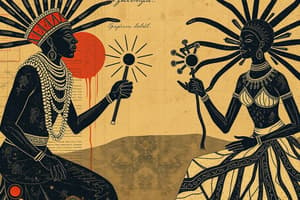Podcast
Questions and Answers
Sino si Sundiata Keita?
Sino si Sundiata Keita?
- Tagapagtatag ng Mali Empire (correct)
- Tagapagtatag ng Kinabukasan ng Guinea-Conakry
- Ama ng Sibilisasyon ng Malian
- Pinakamalakas na Mandinka warrior
Ano ang orihinal na wika ng Sundiata epic?
Ano ang orihinal na wika ng Sundiata epic?
- Manding (correct)
- Yoruba
- Swahili
- Igbo
Saan isinilang si Sundiata?
Saan isinilang si Sundiata?
- Mali Empire
- Niani (correct)
- Kinabukasan ng Mali
- Guinea-Conakry
Ano ang pangunahing layunin ni Sundiata sa pagkakaisa ng iba't ibang etniko sa ilalim ng kanyang pamumuno?
Ano ang pangunahing layunin ni Sundiata sa pagkakaisa ng iba't ibang etniko sa ilalim ng kanyang pamumuno?
Ano ang kahulugan ng kuwen sa Kanlurang Africa?
Ano ang kahulugan ng kuwen sa Kanlurang Africa?
Paano nailalarawan ang Sundiata epic ayon sa teksto?
Paano nailalarawan ang Sundiata epic ayon sa teksto?
Ano ang pinakamahalagang papel ng Griots ayon sa teksto?
Ano ang pinakamahalagang papel ng Griots ayon sa teksto?
Flashcards are hidden until you start studying
Study Notes
Sundiata Epic Translation: A Journey into the World of African Mythology
The Sundiata epic, also known as the Epic of Sundiata, is a foundational piece of West African literature that chronicles the life story of Sundiata Keita, founder of the Mali Empire around the 13th century. This work has been translated from its original language, Manding, into various other languages to make it accessible to readers worldwide. As such, understanding the translations of the Sundiata epic can offer unique insights into African history, culture, and mythology. In this article, we will explore the intricacies of the Sundiata epic's translation process, its author, and the significance of these works in modern literary studies.
Sundiata and His Original Language
Known as the father of the Malian Civilization, Sundiata was born in the village of Niani, located in what today would be part of Guinea-Conakry. He united diverse ethnic groups under his leadership, creating the Kingdom of Kangaba which later became known as the Mali Empire. Although most sources describe Sundiata as having had a good character, they mention him as being given by his mother.
The original text of the Sundiata epic existed in orature—a literary genre that combines oral tradition with writing. It was originally composed in the Mandinka language, one of the largest Afrocentric languages.
The Kuwen Tradition and Its Significance
In West Africa, the term kuwen refers to both the poetic form of the oral tradition and the person who practices it. The kuwen tradition involves improvised poetry performed by Griots, or bards, who recite and compose stories that often include historical facts, personal experiences, and instructional tales. These stories are passed down through generations and are considered essential elements of cultural identity.
The Sundiata epic reflects this kuwen tradition, showcasing the flexibility of the art form while maintaining its core values. By sharing their knowledge, skills, and craftsmanship across time and geography, Griots have ensured that the stories and traditions of their communities continue to thrive.
Translating the Sundiata Epic: Adaptations and Challenges
Translating the Sundiata epic from the original Mandinka language presents several challenges due to its complex structure and the extensive terminology used throughout the text. For example, some words may not have direct equivalents in the target language, making it necessary to devise creative solutions that capture the essence of the original meaning.
One early translation of the Sundiata epic emerged from Senegalese author Cheikh Anta Diop's desire to bridge the gap between Western academic styles and traditional African knowledge systems. Diop's approach aimed to preserve the integrity of the original concept while catering to contemporary expectations.
Since then, many more adaptations have followed, each contributing to the ongoing dialogue between different cultures and literatures. Some notable English versions include those by David Locke, Lamin Sanneh, and Mary Louise Smith.
The Sundiata Epic as a Cultural Bridge
As one of the most influential works in West African literature, the Sundiata epic serves as a valuable link between the past and present, connecting people to their cultural heritage and fostering a deeper appreciation for the rich tapestry of human expression.
Understanding the translations of the Sundiata epic provides insight into how the text has evolved over time, shedding light on its role within the broader context of global literary exchange. By exploring these texts, we gain a more comprehensive view of the world's literary landscape, uncovering connections and comparisons that cross linguistic and geographical boundaries.
Studying That Suits You
Use AI to generate personalized quizzes and flashcards to suit your learning preferences.




